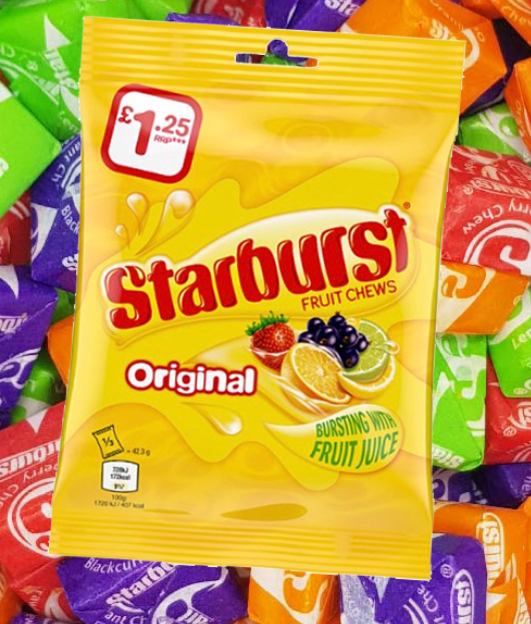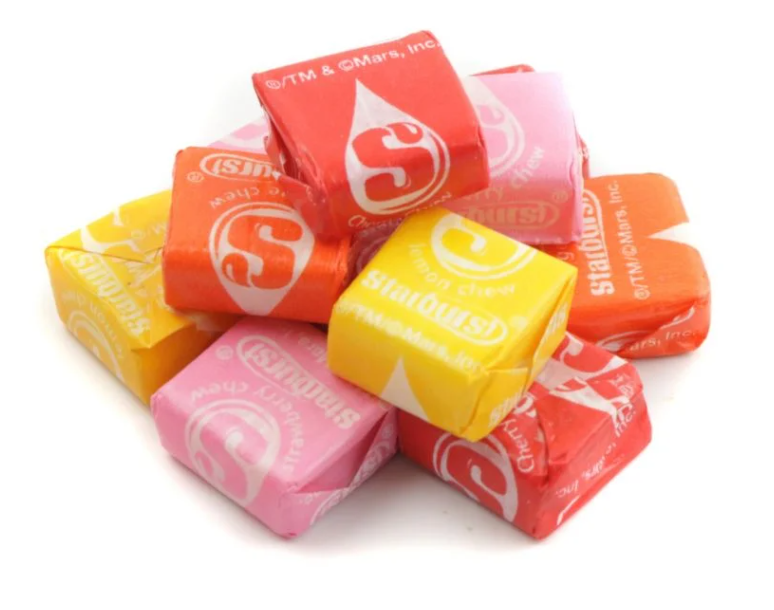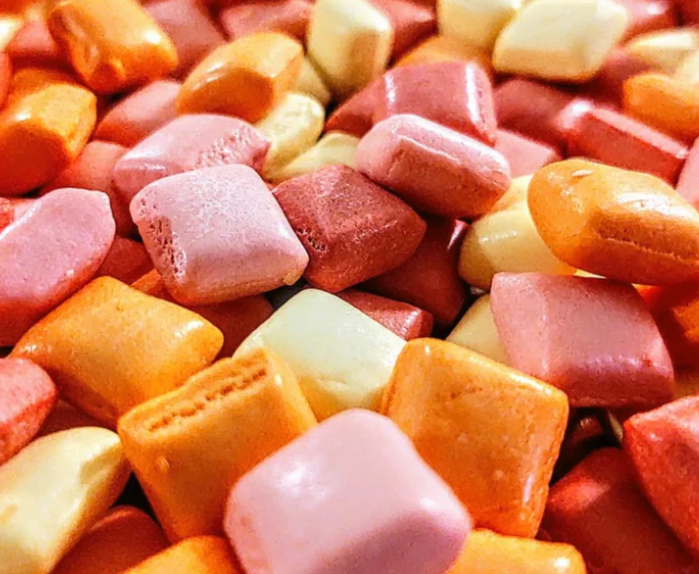Starburst, a beloved fruity candy, sparks debate within the halal diet community. Its permissibility hinges on ingredients and manufacturing processes. Fans of its vibrant colors and juicy flavors should be aware of potential non-compliance with halal rules.

As devout Muslims, we often encounter this question Is Starburst Halal? Can Muslims Eat It? In this comprehensive guide, we explore its ingredients, manufacturing processes, and certifications. Join us on this enlightening journey to find clarity.
What Is Starburst?
Starburst is a popular candy known for its chewy texture and fruity flavors. Each piece is square-shaped and individually wrapped, making it easy to enjoy on the go. Starburst comes in a variety of flavors, including strawberry, lemon, orange, and cherry. These bright, colorful candies are often found in mixed packs, offering a burst of different tastes in each package.
The candy was first introduced in the UK in 1960 under the name Opal Fruits. It was later brought to the United States in 1967 and rebranded as Starburst. Over the years, Starburst has expanded its range to include special editions and tropical flavors, catering to various taste preferences.

Starburst is not just a treat for kids but is also enjoyed by adults. It’s a favorite choice for movie snacks, party favors, and even as an ingredient in some desserts. The candy’s popularity stems from its combination of tangy and sweet flavors, as well as its satisfying chewy texture.
Whether you enjoy them one by one or mix them for a flavor explosion, Starburst continues to be a beloved candy for many people around the world.
Is Starburst Halal?
Starburst, the beloved fruit-flavored candy, sparks debate among Muslims regarding its halal status. The answer varies by country and formulation. In the United States, Starburst contains non-halal gelatin sourced from pigs or non-halal beef, making it unsuitable for a halal diet. However, in the United Kingdom, Starburst avoids gelatin, aligning with halal requirements.
Halal-certified Starburst is commonly available in countries such as Malaysia, Saudi Arabia, and the UK. Remember to verify the packaging for halal certification symbols before making a purchase.
Evidence
An official email from Starburst

On the other hand, Starburst products sold in the UK do not contain gelatin so they can be categorized as halal.
While Starburst uses whey (suitable for vegetarians), it lacks halal certification due to potential alcohol creation during flavor production.
Is Starburst Gelatin Halal?
Gelatin Dilemma and Halal Status:
Mars Wrigley’s Starburst candies frequently raise questions among Muslim communities regarding their halal status. The central concern revolves around the gelatin used in these sweets. Gelatin, primarily derived from beef, is extracted from animal products. Within Islamic dietary laws, consuming anything impure or haram (forbidden) is strictly avoided. As a result, the source of gelatin becomes critical in determining whether Starburst aligns with halal guidelines.

Islamic Scholars’ Perspectives:
Various opinions and rulings exist among different Islamic scholars. Some resources, such as Islam Web, emphasize the principle that any originally impure food or drink can become halal if it undergoes specific transformation and treatment to remove impurities. However, due to the lack of clarity in available information, many Muslims choose to err on the side of caution.
Seeking Clarity Amid Uncertainty:
Conversations with representatives from educational platforms like Spoon University reveal that the community remains uncertain about what they can safely consume. Reliable sources and clear guidelines are essential for Muslims navigating the complex landscape of halal food choices
Can Muslims Eat It?
Starburst candies can be considered halal for Muslim consumers.

Halal Certification and Ingredients:
Starburst candies can be considered halal for Muslim consumers. The Wrigley Company, through a rigorous halal certification process, ensures that the ingredients and manufacturing methods align with Islamic dietary guidelines. However, it’s essential to note that variations of Starburst exist, and their halal status depends on specific factors.
Gelatin and Ethyl Alcohol Considerations:
Some Starburst variants may contain gelatin, which can be derived from non-halal sources (such as pigs or non-halal beef). To determine the halal status, check the source of gelatin listed on the packaging. Additionally, Starburst contains ethyl alcohol obtained from fermented sugar. Whether this alcohol dissipates during production affects its overall halal compliance. Always verify reputable halal certifications on the packaging before enjoying this fruity treat.
As always, it’s advisable to check the packaging for reputable halal certifications before indulging in this fruity delight.
Conclusion
Ingredient Awareness for Muslim Consumers:
When considering food products, especially those like Parmesan cheese, Muslim customers are advised to exercise caution due to variations in ingredient lists across different markets. To ensure compliance with dietary restrictions, it’s essential to meticulously examine the ingredient labels before making a purchase. By doing so, individuals can verify that they are selecting a vegan variety devoid of animal-based gelatin. This proactive approach aligns with their beliefs and dietary requirements.
Navigating Halal Choices:
The decision regarding Parmesan cheese’s halal status remains subjective. While some scholars and Islamic organizations permit it if the rennet originates from halal sources, others may hold different views. Ultimately, it’s a personal choice. Muslims should critically assess the contents of foods like Parmesan, seeking options made without animal rennet. These rennet-free cheeses are often considered halal, allowing individuals to make informed and intelligent selections based on their religious convictions.
FAQs
Does Starburst have gelatin?
Starburst candies reveal intriguing disparities between the US and the UK. In the US, Starburst contains gelatin derived from animal collagen, rendering it unsuitable for vegetarians and vegans. In contrast, UK Starburst omits gelatin, making it a viable choice for those who avoid animal products.
Are starbursts kosher?
Starburst candies, produced by Wrigley, offer a variety of flavors, including Starburst Fruit Chews, Original, Tropical, Sweets & Sours, FaveReds, Summer Splash, and Sweet Heat. A significant aspect of this discussion centers around the gelatin found in many Starburst products.
Typically derived from beef, this gelatin poses questions for individuals adhering to Jewish dietary laws. The manufacturer’s official response regarding kosher certification becomes pivotal. According to them, certain Starbursts contain ingredients that do not meet the stringent requirements of kosher laws. Therefore, it’s advisable to check the packaging if maintaining a kosher diet is essential to you.
ARE STARBURST PRODUCTS HALAL CERTIFIED?
No, Starburst products are not halal-certified.
ARE STARBURST CHEWING GUM AND STARBURST JELLY BEANS HALAL?
Yes, Starburst chewing gum and Starburst jelly beans are halal.
